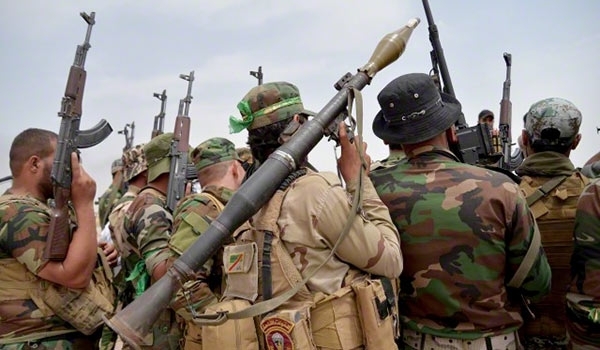
“Iran plays a major role in training the popular forces and we also used the military experts of Hezbollah Movement in our military training bases,” Abi Jihad, an Iraqi popular forces commander, told the Lebanese al-Nahar daily on Sunday.
Noting that in any training base near the battlefields at least 2 Hezbollah military experts are present for every 70 forces, he said that in addition to receiving training to use state-of-the-art weapons and mortars, several reconnaissance and intelligence courses are also held.
Iranian officials have underlined Tehran’s military advisory role in Iraq and Syria, but meantime, said no Iranian Basiji or Islamic Revolution Guards Corps (IRGC) forces have been sent to the two Arab states.
“As said before, Basij and the IRGC play an advisory role in the resistance fronts and they are transferring their experiences to the fighters and this need is felt more in Syria and less in Iraq,” Commander of Iran’s Basij (volunteer) Force Brigadier General Mohammad Reza Naqdi said in an interview with Iran’s state-run TV in November.
“We help the two countries at the request of their armies and we are just transferring our experience, but haven’t sent any forces to these states,” he reiterated.
Naqdi, meantime, said that there are many Basiji and IRGC forces who have persistently demanded to be deployed in Iraq and Syria to defend the Shiites’ holy shrines and the Iraqi and Syrian people against the terrorists, but they have not been dispatched to these countries.
Also in November, Lieutenant Commander of the Islamic Revolution Guards Corps Brigadier General Hossein Salami underlined the IRGC’s firm decision to keep its military advisors in Syria until gaining final victory against the terrorist groups and liberate all Syrian territories.
“The operations (in Syria) have been successful so far and God willing, they will continue and other successes will also follow,” Salami told FNA.
“The main goal is setting the Syrian nation free from the hands of the terrorists and this will continue in any form until attainment of proper results,” he added.
Salami also underscored that the IRGC has not changed the method of its presence in Syria which has earlier been described as an advisory role.
Iran and Hezbollah have been helping the Syrian army and popular forces in retaking control over the country’s towns back from the terrorists.
The Iranian officials have always emphasized that it has not deployed forces in Syria and its presence in the friendly Arab country is limited to a counseling role.
But Hezbollah resistance force sent its fighters to Northern Syria to help the country’s army and popular forces take back the strategic province of Aleppo from the terrorist groups, including the al-Nusra Front and ISIL.







